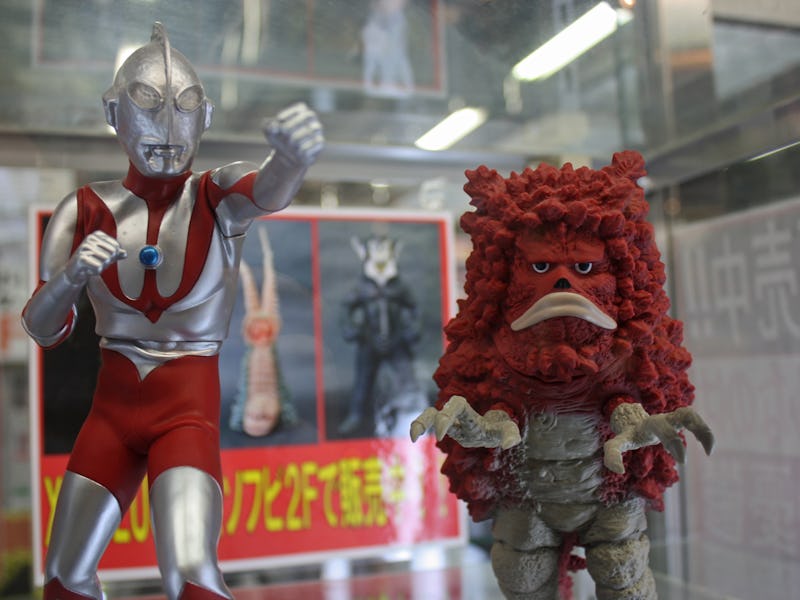The Crazy Kaiju Movies That Inspired 'Colossal'
Money-eating monsters, giant space squids, and bootleg Godzilla.

Nacho Vigalondo grew up in Spain an avid fan of kaiju-eiga movies, scanning TV and combing import stores in the ‘80s and ‘90s in search of anything connected to Japanese monster films. And his love for the genre is evident in his new film, Colossal, a kaiju-dramedy hybrid that stars Anne Hathaway as a 30-something drunk who controls a monster that rampages across Seoul. It is a monster with agency, an important distinction that was inspired by King Kong, the original kaiju movie.
“It’s one of the few monster movies in which the monster has the identity of another character. He’s not just something the other characters are trying to stop; he’s not just a natural disaster,” Vigalondo explained. “I included a line in my movie for that reason; the newscaster says, ‘Whether it’s an attack or a natural disaster is unclear.’ Most of the times, kaiju-eiga films are disaster films, but in the case of King Kong, he was not just a character, he was the dramatic force of the climax.”
Still, he wasn’t just interested in King Kong and Godzilla, the iconic King of the Monsters. As the filmmaker told Inverse, “I enjoy the unorthodox kaiju.”
There are little elements of Colossal that give that away; design of the monster in that film recalls the infamous North Korean kaiju Pulgasari, while a robot that appears later is reminiscent of the deep cut cartoon character [Mazinger Z](http://mazinger.wikia.com/wiki/MazingerZ(TV_Mecha)).
Vigalondo can rattle off a long list of offbeat and little-known kaiju movies, featuring monsters that few people recognize. The first on his list: the 1957 flick Mysterians, one of the many kaiju movies made by Godzilla director Ishiro Honda.
“It’s about a race of guys from outer space: They land and create a dome for their race, and ask for women,” Vigalondo explained. “It’s campy, of course, but it’s interesting that the kaijus are the tools that they use to fight the humans. It’s great how this movie is like a campy adventure, with those sinister sexual undertones and the political layer going on there. It’s really weird and really interesting.”
Another one of Vigalondo’s early favorites mixes an alien monster that makes life difficult for those in power in Japan: Dogora, a 1964 film made by Honda and special effects wizard Eiji Tsuburaya.
“Tentacles coming from space! It’s a gangster movie, with flying tentacles from outer space. It’s a Lovecraftian film,” he said, excitedly. “Here’s the plot: Giant flying jellyfish fight in Japan, absorbing diamonds, attacking gangsters, and destroying buildings. This is the best movie plot ever.”
Vigalondo has a soft spot for the work of Tsuburaya, who pioneered the art of putting dudes in rubber suits and having them crush miniature cities. That includes the effects master’s iconic TV series, which has been rebooted nearly as much as Super Sentai, the precursor to Power Rangers.
“I really loved the Ultra Q series, the series prior to Ultraman. I’m in love with that format, the kaiju of the week. It’s like the X-Files, but instead of facing a proper-sized monster, they fight a different kaiju. All those monsters in the series were amazing. My favorite design for a kaiju is Garamon. It was born in one of the Ultra Q episodes and became a foe for Ultraman later, under a different name.
Vigalondo can go on and on about Ultra Q and Ultraman, picking out obscure kaiju and costumes. “Some of the monsters were recycled from other designs — some are even the same costume with different stuff on them,” he said excitedly. “One [Gomess] was even a Godzilla costume with different details on it. Another one of the monsters is a guy who eats money. He’s a danger to the economy because he eats money.”
Even when it comes back to the best-known kaiju, Godzilla, Vigalondo delights in the most off-beat (and arguably campy) of the big guy’s 31 movies.
“I’m into the older Godzilla movies,” he said, referring to the run of movies that were targeted at young viewers. “I loved the way the 2014 movie was shot, but there was some trouble with the script. But I’m more into the old stuff. I try not to be a cynic about that, because I don’t need to be more cynical in my life, and I love to like things for the way they are. When I say I like kaiju films, it’s because I find something really interesting in them.”